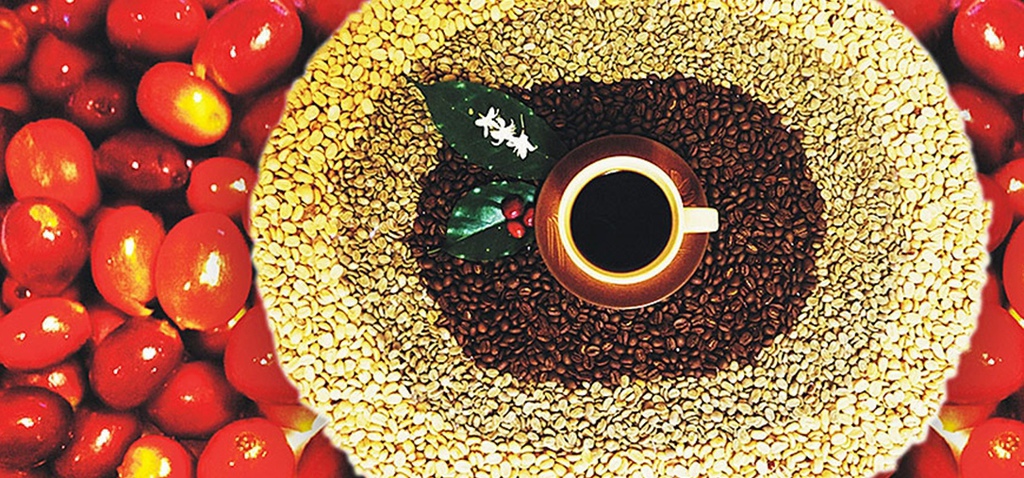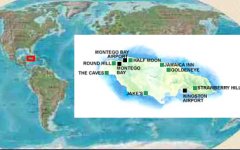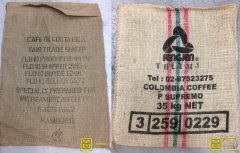Rolls-Royce in Coffee-introduction of production and Marketing characteristics and Origin Information of Coffee in Taiwan

For professional baristas, please follow the coffee workshop (Wechat official account cafe_style)
After the first sip of Taiwanese coffee, the tip of the tongue slowly changed from bitterness to sweetness. The sweet, mellow, and rich taste lingered in the mouth for a long time. When the temperature dropped slightly to 85 ℃, the unforgettable taste came back to my heart again, perhaps with a hint of almonds, maybe with a hint of micro-walnuts. When the unique fragrance of the heart seems to remain in the mouth, the thick sweetness has quietly filled the whole throat rhyme, and the feeling of happiness is also sweeping towards people.
In fact, people who have really drunk Taiwan coffee will be touched by the multi-level taste of Taiwan coffee. In addition to the rich oil and unique aroma of Taiwan coffee itself, the level of strong, pure and fragrant coffee is very rich, and it can be said to be the best in coffee. Taiwan coffee has been described as the "Rolls-Royce" of coffee!
Taiwan coffee is rising as a "black gold". The top roasted beans soar to NT $4000 or NT $5000 a pound, which is on a par with high-priced musk coffee. As long as it is crowned with "Taiwan coffee," the price will jump triple. In a coffee shop, a cup of Taiwanese coffee costs NT $200 to NT $300. "the most expensive roasted coffee is NT $4000 or NT $5000 a pound. High-priced musk coffee from abroad is priced at 6000 or 7000 yuan a pound in department stores, while it can be bought at 3000 or 4000 yuan in other channels.
Coffee in Taiwan is expensive not only because of low production and scarcity, but also because labor costs are too high. Female workers in Taiwan earn at least US $20 a day, while third World producing countries often earn less than US $1. This is also the reason why Taiwan coffee is only willing to import rather than buy local potatoes under the consideration of the cost of large coffee manufacturers.
Taiwan coffee used to be used by the emperor of Japan. Yang Fufu, director of supply and marketing of the Gukeng Township Peasants' Association, points out that Taiwan coffee has a hierarchical sense of non-bitterness, non-astringency, non-acidity, and warmth, and that people with high altitude have a particularly mellow taste and rich taste.
According to the data on the website of the Gukeng Township Public Office, at present, Taiwan's coffee producing areas include Nantou Huisun Forest Farm and Lugu, Yunlin Hebaoshan, Tainan Kuantou Mountain, Hualien Mizui Farm, Chiayi Alishan, and Pingtung Dawu Mountain, with an planting area of about 700 hectares and an annual output of about 100 metric tons, which is less than 1/10 of Taiwan's consumption, so most coffee beans still rely on imports. Since the price of imported coffee beans is much lower than that of local coffee beans, which are rarely produced, it is very difficult for operators not to mix local potatoes with imported beans, while those who insist on not mixing one bean will be more difficult and lonely, but even more precious. Because the characteristics of coffee beans are actually the same as those of tea, coffee beans produced from each mountain have different flavors. If they are mixed with other imported beans or coffee beans at lower elevations, they will lose their original flavor. So really good tea and good coffee should be very pure.
Due to the characteristics of production and marketing, although Taiwan coffee is expensive for Rolls-Royce, the main market is boutique coffee lovers and rural leisure boutique cafes, taking a leisurely trip to Taiwan coffee producing areas. Nantou Huisun, Yunlin Gukeng, Tainan Dongshan, Hualien Wuhe, Chiayi Ali Mountain and other farm cafes, enjoy the small white flowers of coffee trees with jasmine fragrance, from the mountains to the Azure Coast, have a leisurely cup of coffee Enjoy the beautiful scenery at different elevations and move the romantic moment!
People who are familiar with coffee know that coffee is divided into three main categories: Arabica, Robusta and Liberica. Taiwan coffee refers to Arabica coffee.
The history of coffee in Taiwan can be traced back to the Qing Dynasty, when the Dutch introduced a small amount of coffee. During the Meiji period in Japan (1868-1912), coffee was planted in the Ogasawara islands, and then more widely in Okinawa and Taiwan, which was a Japanese colony at that time. However, the quality of the coffee produced in Taiwan is better than that of Japan because of its superior climate, latitude and soil. Before Taiwan's coffee craze revived in 2003, a small number of interested people who did not give up Taiwan coffee retained the original coffee ── Arabica coffee from the Japanese occupation period, and these few supporters laid an important foundation for the comeback of Taiwan coffee today.
Coffee trees can now be seen in Taitung Township and Luye Township. In the 1980s, home-grown coffee could be seen on the side of the Taijiu highway. Twenty years ago, Pan Yung-feng, director general of the Luye Rural Peasant Association, tried to grow coffee. At that time, the market of tea was good, and coffee was gradually replaced by tea gardens. Luye Township mainly grows Arabica varieties and adopts organic cultivation. At present, it mainly sells coffee and raw beans. As the price of coffee beans has become popular, Luye Township has set off a trend of growing coffee. Five years ago, farmers began to waste tea gardens and grow Taiwanese coffee, which is popular in the market, with an area of about 15 hectares. The harvest has increased since last year, and the newly opened Luming Hotel will also serve Luye coffee.
In Wuhe platform, Mizuho Township, Hualien County, as early as the Japanese occupation period, the Japanese Kimura Company planted the first "Arabica" coffee in the eastern part of the country. It was once one of Taiwan's three major coffee producing areas. After the retrocession, due to rising labor costs, the Wuhe platform Coffee Garden gradually abolished and changed the planting of tea. Of the old coffee trees planted during the Japanese occupation, only the Golden Crane Tea Garden still has an area of about four hectares. Mainly for Arabica and Robista two varieties, because of Robista poor quality, poor taste, now almost no longer see. In recent years, there has been a coffee craze in Taiwan, and many farmers have changed to planting coffee. The area of Wuhe coffee has increased year by year, and now there are about 30 to 40 hectares of coffee plantations.
Alishan grows coffee, mostly in the Zou tribes such as Chashan, Xinmei, Leye, Dabang, Lijia and Laiji, covering an area of more than 30 hectares, and many coffee plantations also emphasize organic cultivation. The first person to plant coffee trees in Alishan was in Leye Village, where the owner of Zou Chuyuan began to plant coffee trees on a trial basis, which was quite successful. In the Zou tribe, thousands of meters above sea level, the Alishan Farmers Association helps tribesmen grow Arabica varieties of coffee. Due to the large temperature difference in the climate, the coffee beans have a better flavor. The output of Alishan alpine coffee is small. The Alishan Farmers Association helps farmers commercialize their products and bake them into high-quality coffee beans. There are also sharp-eyed businessmen who see the good throat of Alishan coffee, contract with local farmers and buy alpine coffee directly. For example, Jianhu Mountain World sells Alishan alpine coffee in the coffee museum, which has a good reputation. As Alishan has Zou customs and excellent mountain and forest scenery, the local landscape coffee garden is also open, and more and more Zou tribesmen are investing in growing coffee.
During the period of the Japanese occupation, coffee was planted in Qiantou Mountain in Dongshan, Tainan. The planting area was between 300 and 800 meters above sea level, and the producing areas were concentrated in Zhongnanshi Village and Dongyuan Village. Mainly planted in Arabica, due to the high altitude, coffee beans full, drink neither sour nor bitter, pick and sell themselves, the land price is 1200 yuan per pound. The planting area of about 150 hectares is the largest in Taiwan, and Dongshan coffee is of good quality, with a fairly high level of roasted aroma, acidity, concentration, overall aroma and smell.
In Hebaoshan and Huashan, Gukeng Township, about 75 hectares of Arabica coffee trees were planted by economic farms during the Japanese occupation era. at that time, the coffee here was of particularly good quality and was paid tribute to the Japanese royal family, and the value of honor was equal to that of Taiwan juniper trees. More than 10 years ago, Zhang Laien returned to his hometown of Hebao Mountain and replanted coffee trees and opened Baden Coffee in Hebao Mountain. He was the first person to give Gukeng Coffee a name, and it was also the first coffee shop to commercialize "Taiwan Coffee." Hebao Mountain and Huashan Mountain range from 300 to 600 meters above sea level, belonging to sandy soil and good drainage, which is especially suitable for planting Arabica coffee trees. Ten years ago, Hebao Mountain planted only 2 hectares of coffee trees, but last year it soared to 100 hectares, mainly in Huashan, Guilin and Hebaoshan. Because Huashan and Guilin can overlook the Jiannan Plain, 50 or 60 scenic coffees have been opened on the hill. it has become the place with the most scenic coffee in Taiwan.
Nantou Huisun Forest Farm, an experimental forest farm at Imperial University in Hokkaido during the Japanese occupation, began to grow Arabica coffee in 1949. With 70 years of coffee cultivation and technology, coffee farm planting way is relatively extensive, no pesticide and no fertilization, appeal for organic and pure coffee. The main varieties of coffee grown are Arabica, which is said to be introduced from England in the Qing Dynasty and belongs to a relatively high-quality coffee variety. Huisun Forest Farm is a sandy soil with good drainage, about 770 meters above sea level, and the average annual temperature is about 16 to 26 degrees Celsius, which is very suitable for the growth of Arabica coffee trees. The coffee in the forest farm is 100% organic, without pesticide or fertilization. let the coffee absorb nutrients from the natural soil, which also created the special flavor of Huisun Coffee. Huisun Coffee also won the silver medal of the World Taste of Agricultural products in the United States.
Important Notice :
前街咖啡 FrontStreet Coffee has moved to new addredd:
FrontStreet Coffee Address: 315,Donghua East Road,GuangZhou
Tel:020 38364473
- Prev

A brief introduction to the main Coffee producing areas in the Caribbean and their well-known Coffee Flavor characteristics
For the exchange of professional baristas, please follow the coffee workshop (Wechat official account cafe_style) Jamaica (Jamaica) well-known representative coffee: Blue Mountain Jamaica is a small republic located in the Caribbean. Its Blue Mountain coffee is famous for its mild taste, low acidity and high performance, and is currently the most expensive and popular coffee in the world.
- Next

Coffee cold knowledge: Colombian coffee beans can only use special sacks.
Professional barista communication Please pay attention to the coffee workshop (Wechat official account cafe_style) the common sacks in the market are like figure (1), which are commonly used in many countries, but they are different in Colombia! Colombia stipulates that raw coffee beans produced in Colombia can only use special sacks (figure 2), not other sacks! If what you receive is not dedicated
Related
- Does Rose Summer choose Blue, Green or Red? Detailed explanation of Rose Summer Coffee plots and Classification in Panamanian Jade Manor
- What is the difference between the origin, producing area, processing plant, cooperative and manor of coffee beans?
- How fine does the espresso powder fit? how to grind the espresso?
- Sca coffee roasting degree color card coffee roasting degree 8 roasting color values what do you mean?
- The practice of lattes: how to make lattes at home
- Introduction to Indonesian Fine Coffee beans-- Java Coffee producing area of Indonesian Arabica Coffee
- How much will the flavor of light and medium roasted rose summer be expressed? What baking level is rose summer suitable for?
- Introduction to the characteristics of washing, sun-drying or wet-planing coffee commonly used in Mantenin, Indonesia
- Price characteristics of Arabica Coffee Bean Starbucks introduction to Manning Coffee Bean Taste producing area Variety Manor
- What is the authentic Yega flavor? What are the flavor characteristics of the really excellent Yejasuffi coffee beans?

